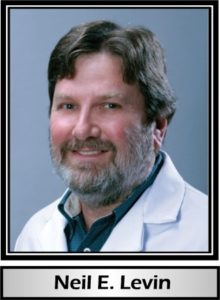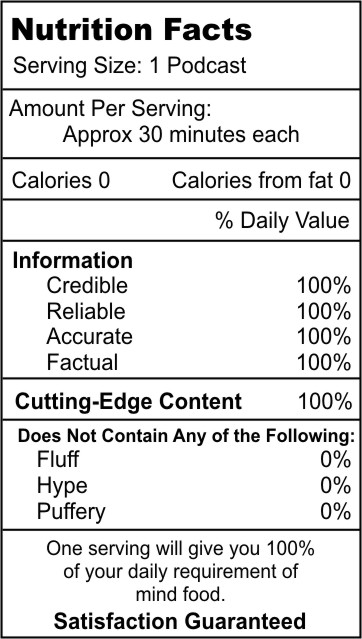Podcast: Play in new window | Download (Duration: 53:52 — 98.9MB)
The science of nurturing your brain as you age.
 I remember being told that a brain is fixed and there is very little one can do to influence brain health. Of course this was at a time when good nutrition was considered quackery and foolishness. The average diet would provide more than enough nutrition for your body, brain included. That type of thinking seems quaint by today’s standards. Even though we have come a long way in our thinking about brain health and how nutrition influences brain structure, function and resiliency, most people don’t know what to do promote optimal brain health.
I remember being told that a brain is fixed and there is very little one can do to influence brain health. Of course this was at a time when good nutrition was considered quackery and foolishness. The average diet would provide more than enough nutrition for your body, brain included. That type of thinking seems quaint by today’s standards. Even though we have come a long way in our thinking about brain health and how nutrition influences brain structure, function and resiliency, most people don’t know what to do promote optimal brain health.
In this interview, Neil E. Levin discusses the current state of science and some of the current recommendations about how to support brain health. We spend a bit of time on the nutritional recommendation for foods from some of the country’s best medical resources. What everybody seems to agree on is that high quality, high nutrition foods are the foundation for better brain health. A lot of people miss that simple truth, that it starts with good food. Neil also makes the point that lifestyle factors are also very important. So managing stress, getting enough sleep, regular exercise and using your brain are important lifestyle factors that you must consider.
Foods are Foundational
Neil notes that foods are now being recommended by sources such as WebMD and Harvard Health Watch as being important to preserve brain function. Before you embark on a supplement program for brain health, you should make sure you are eating nutritious foods and avoiding certain other classes of foods. If you pause to think about it, foods provide all of the compounds that make up our body. There are tens of thousands of compounds found in foods. Refined foods have little of their original nutritional value.
The average American diet gets most of its calories from refined foods like flour and sugar, refined oils that are mostly pro-inflammatory oils and mostly processed foods. They simply don’t provide enough of the good stuff and too much of the bad stuff. Neil gives us an overview of the types of recommendations by some of the credible sources.
Brain Friendly Foods (excerpt from WebMD)
MIND stands for Mediterranean-DASH Intervention for Neurodegenerative Delay. The MIND approach “specifically includes foods and nutrients that medical literature and data show to be good for the brain, such as berries,” says Martha Clare Morris, ScD, director of nutrition and nutritional epidemiology at Rush University Medical Center.
You eat things from these 10 food groups:
 Green leafy vegetables (like spinach and salad greens): At least six servings a week
Green leafy vegetables (like spinach and salad greens): At least six servings a week- Other vegetables: At least one a day
- Nuts: Five servings a week
- Berries: Two or more servings a week
- Beans: At least three servings a week
- Whole grains: Three or more servings a day
- Fish: Once a week
- Poultry (like chicken or turkey): Two times a week
- Olive oil: Use it as your main cooking oil.
- Wine: One glass a day
You avoid:
- Red meat: Less than four servings a week
- Butter and margarine: Less than a tablespoon daily
- Cheese: Less than one serving a week
- Pastries and sweets: Less than five servings a week
- Fried or fast food: Less than one serving a week
This way of eating focuses on nutritious whole foods, so “it’s not just good for your brain. It’s good your heart and overall health, too,” says Majid Fotuhi, MD, PhD. He is the chairman and CEO of the Memosyn Neurology Institute. (end excerpt)
Recommendations like these are not a surprise if you have been interested in health as long as I have. I have been recommending these foods for 45 years. It’s wonderful to have the credible institutions now recognizing the foundational importance of foods. Food IS important to health. You have to eat better foods no matter what your state of health. So when you eat these foods, you are not treating disease. It does not work that way. Your body is very efficient and uses nutrients throughout the body. So foods nourish the body. The body does the work when it has the needed raw materials. Bottom line, you have to eat good amounts of the right foods to get the best results with brain health.
Supplements:
In this part 1, Neil discusses the importance of the following nutrients. Part 2 will focus on additional nutrients for brain support.
- DHA: DHA is the important omega-3 fatty acid in the brain and eyes.* Most Americans are too low in omega-3 and way too high in omega-6. You must correct the fatty acid imbalance for best health.*
- MCT Oil: This particular fat from coconut or palm oil provides efficient energy to the brain and does not tend to store as fat.*
- Acetylcholine: Acetylcholine is a neurotransmitter that allows communication between cells in your brain. Acetylcholine is also the neurotransmitter that controls the contraction of skeletal muscle.
 Magnesium: Neil makes the important point that there are many forms of magnesium complexes and they are not the same. We discuss a form of magnesium that is shown to cross the blood/brain barrier – magnesium threonate.* Magtein™ is one of those patented trademarked raw materials with good clinical science.
Magnesium: Neil makes the important point that there are many forms of magnesium complexes and they are not the same. We discuss a form of magnesium that is shown to cross the blood/brain barrier – magnesium threonate.* Magtein™ is one of those patented trademarked raw materials with good clinical science. Curcumin: Neil discusses a form of curcumin called Longvida®. This form of curcumin has been shown to result in significant levels of free curcumin with corresponding benefits.* Learn more about the science at Longvida’s® website. Different curcumin extracts are not made like Longvida® and do not provide the same benefits. Follow the science.
Curcumin: Neil discusses a form of curcumin called Longvida®. This form of curcumin has been shown to result in significant levels of free curcumin with corresponding benefits.* Learn more about the science at Longvida’s® website. Different curcumin extracts are not made like Longvida® and do not provide the same benefits. Follow the science.
In Part 2
 We will continue the exploration of nutrients for brain support. When you provide the nutrients that feed your brain, some of the benefits can be improved memory, mental acuity and concentration. Some nutrients support other brain functions such as mood and sleep as well.
We will continue the exploration of nutrients for brain support. When you provide the nutrients that feed your brain, some of the benefits can be improved memory, mental acuity and concentration. Some nutrients support other brain functions such as mood and sleep as well.
As you explore your options remember the best product is the one that works best for you. Remember that each nutrient is unique and distinct from one another in providing benefits. This is your journey of discovery. With patient exploration of your options and gaining personal knowledge about yourself along the way you will be most likely to find success. Take quality forms of nutrients from trusted companies.
About Neil E. Levin, CCN, DANLA
Neil E. Levin is the Senior Nutrition Education Manager and a product formulator for NOW® . He is a board-certified clinical nutritionist with a diplomat in advanced nutritional laboratory assessment. The U.S. Natural Products Association (NPA) presented Neil its Industry Champion Award in 2008 for “people who have made notable individual contributions to the natural products industry above and beyond what is expected to achieve commercial success.” Neil’s interviews and articles are published in magazines and newspapers. He has been featured in many radio interviews and television news reports. Neil blogs at www.honestnutrition.com; is on Facebook (Honest Nutrition) and Twitter (neilelevin).












{ 0 comments… add one now }